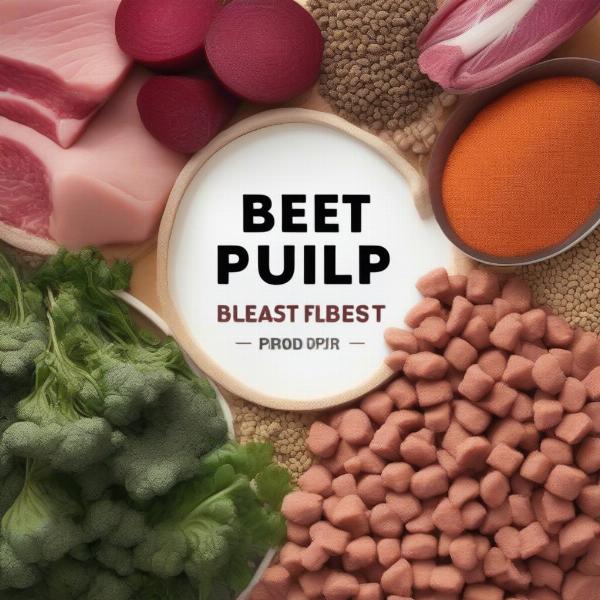Dealing with excessive dog poop can be a smelly and frustrating experience. The right dog food can significantly impact your dog’s digestive health and reduce poop volume. Finding the best dog food for less poop involves understanding ingredients, digestibility, and your dog’s individual needs. This article will explore how to choose the best food for your furry friend, leading to less frequent and more manageable potty breaks.
Understanding the Link Between Dog Food and Poop Volume
What your dog eats directly affects their digestive system and the amount they poop. Foods that are difficult to digest result in more waste, while highly digestible foods are absorbed efficiently, leaving less behind. Several factors contribute to poop volume, including fiber content, ingredient quality, and the presence of fillers.
The Role of Fiber
Fiber plays a complex role in digestion. While some fiber is beneficial for gut health, too much can increase stool bulk. Look for dog foods with moderate fiber content from easily digestible sources like beet pulp or prebiotic fibers.
Ingredient Quality and Digestibility
High-quality ingredients are more easily broken down and absorbed by your dog’s digestive system. Look for foods with whole meat sources listed as the first ingredients, avoiding by-products and fillers.
Fillers and Additives
Fillers like corn, wheat, and soy are often used to bulk up dog food but offer little nutritional value. These ingredients can be difficult for dogs to digest, leading to increased poop volume. Choose foods without artificial colors, flavors, and preservatives, as these can also irritate the digestive system.
Choosing the Best Dog Food for Less Poop
Selecting the right food can be overwhelming with so many options available. Consider these factors when making your decision:
Reading Dog Food Labels
The ingredient list is your best guide. Look for whole meat sources, moderate fiber, and avoid fillers and artificial additives. Check the guaranteed analysis for protein, fat, and fiber percentages.
Considering Your Dog’s Individual Needs
Factors like age, breed, activity level, and allergies can influence the best food choice. Puppies and active dogs require higher protein and fat, while senior dogs may benefit from easier-to-digest formulas.
Consulting with Your Veterinarian
If your dog has persistent digestive issues or allergies, consult your veterinarian. They can recommend specific diets or brands tailored to your dog’s needs.
 Dog Food Ingredients for Less Poop: Focus on quality
Dog Food Ingredients for Less Poop: Focus on quality
Transitioning to a New Dog Food
Switching dog foods abruptly can cause digestive upset. Gradually introduce the new food over 7-10 days, mixing increasing amounts with the old food. This allows your dog’s system to adjust and minimize potential issues.
Monitoring Your Dog’s Poop
Once you’ve transitioned, observe your dog’s poop. Ideally, it should be firm, formed, and easy to pick up. If you notice any changes in consistency, frequency, or other digestive issues, consult your veterinarian.
Conclusion
Finding the best dog food for less poop involves choosing high-quality, easily digestible ingredients, and considering your dog’s individual needs. By carefully selecting the right food and transitioning gradually, you can help your dog maintain a healthy digestive system and reduce the amount of waste you have to clean up. Remember to consult your veterinarian if you have any concerns about your dog’s digestive health.
FAQ
-
How long does it take to see a difference in poop volume after switching dog food? It can take a few weeks for your dog’s digestive system to fully adjust to a new food.
-
Can switching to a grain-free diet help reduce poop volume? Not always. Some dogs thrive on grain-free diets, while others may experience digestive issues.
-
Are expensive dog foods always better for less poop? Price isn’t always an indicator of quality. Focus on ingredients and digestibility rather than price alone.
-
What if my dog still produces a lot of poop on a high-quality diet? Consult your veterinarian. Underlying health issues could be contributing to the problem.
-
Can probiotics help reduce poop volume? Probiotics can support gut health and improve digestion, potentially leading to less poop.
-
Is it normal for my dog’s poop to change color with a new food? Slight color changes can be normal depending on the ingredients. However, drastic or concerning changes warrant a vet visit.
-
What are some signs of digestive upset in dogs? Vomiting, diarrhea, loss of appetite, gas, and abdominal pain can indicate digestive issues.
Internal Links:
Check out these related articles on ILM Dog:
- Learn more about dog walking essentials: dog walking bag waterproof
- Plan your next adventure with your furry friend: dog walking island
- Find out about upcoming dog-friendly events: aldershot lido dog day 2024
- Discover a dog-friendly community: dog valley rd
About ILM Dog:
ILM Dog is your trusted international resource for all things dog-related. We provide expert advice and practical tips on dog breeds, health, training, nutrition, grooming, and much more. Whether you’re a new dog owner or a seasoned expert, ILM Dog offers valuable insights and resources to help you provide the best possible care for your canine companion. From choosing the right breed to addressing health concerns and finding the best dog food for less poop, we’ve got you covered. Contact us for more information at [email protected] or +44 20-3965-8624.